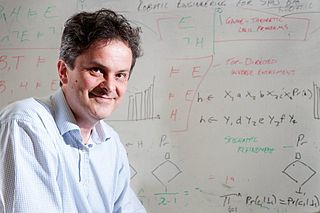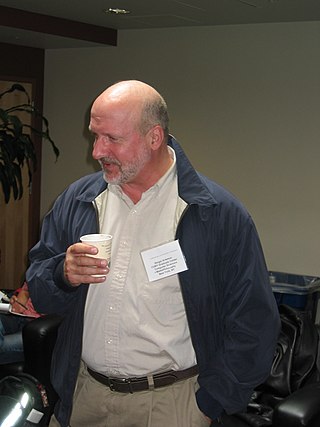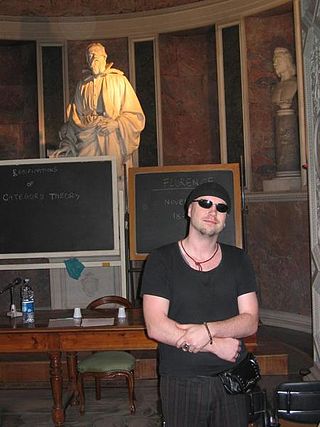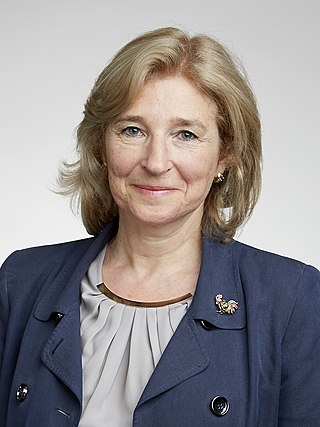Related Research Articles

Lotfi Aliasker Zadeh was a mathematician, computer scientist, electrical engineer, artificial intelligence researcher, and professor of computer science at the University of California, Berkeley. Zadeh is best known for proposing fuzzy mathematics, consisting of several fuzzy-related concepts: fuzzy sets, fuzzy logic, fuzzy algorithms, fuzzy semantics, fuzzy languages, fuzzy control, fuzzy systems, fuzzy probabilities, fuzzy events, and fuzzy information. Zadeh was a founding member of the Eurasian Academy.

Samson Abramsky is Professor of Computer Science at University College London. He was previously the Christopher Strachey Professor of Computing at Wolfson College, Oxford, from 2000 to 2021.
Formal epistemology uses formal methods from decision theory, logic, probability theory and computability theory to model and reason about issues of epistemological interest. Work in this area spans several academic fields, including philosophy, computer science, economics, and statistics. The focus of formal epistemology has tended to differ somewhat from that of traditional epistemology, with topics like uncertainty, induction, and belief revision garnering more attention than the analysis of knowledge, skepticism, and issues with justification.

Distributional semantics is a research area that develops and studies theories and methods for quantifying and categorizing semantic similarities between linguistic items based on their distributional properties in large samples of language data. The basic idea of distributional semantics can be summed up in the so-called distributional hypothesis: linguistic items with similar distributions have similar meanings.

Stephen H. Muggleton FBCS, FIET, FAAAI, FECCAI, FSB, FREng is Professor of Machine Learning and Head of the Computational Bioinformatics Laboratory at Imperial College London.
Categorical quantum mechanics is the study of quantum foundations and quantum information using paradigms from mathematics and computer science, notably monoidal category theory. The primitive objects of study are physical processes, and the different ways that these can be composed. It was pioneered in 2004 by Samson Abramsky and Bob Coecke. Categorical quantum mechanics is entry 18M40 in MSC2020.

Sergei Nikolaevich Artemov is a Russian-American researcher in logic and its applications. He currently holds the title of Distinguished Professor at the Graduate Center of the City University of New York where he is the founder and head of its research laboratory for logic and computation. His research interests include proof theory and logic in computer science, optimal control and hybrid systems, automated deduction and verification, epistemology, and epistemic game theory. He is best known for his invention of logics of proofs and justifications.

Bob Coecke is a Belgian theoretical physicist and logician who was professor of Quantum foundations, Logics and Structures at Oxford University until 2020, when he became Chief Scientist of Cambridge Quantum Computing, and after the merger with Honeywell Quantum Systems, Chief Scientist of Quantinuum. In January 2023 he also became Distinguished Visiting Research Chair at the Perimeter Institute for Theoretical Physics. He pioneered categorical quantum mechanics, Quantum Picturalism, ZX-calculus, DisCoCat model for natural language, and quantum natural language processing (QNLP). He is a founder of the Quantum Physics and Logic community and conference series, and of the applied category theory community, conference series, and diamond-open-access journal Compositionality.
Philippa Anne Gardner is a British computer scientist and academic. She has been Professor of Theoretical Computer Science at the Department of Computing, Imperial College London since 2009. She was director of the Research Institute in Automated Program Analysis and Verification between 2013 and 2016. In 2020 Gardner was elected Fellow of the Royal Academy of Engineering.

Polina Leopoldovna Bayvel is a British engineer and academic. She is currently Professor of Optical Communications & Networks in the Department of Electronic and Electrical Engineering at University College London. She has made major contributions to the investigation and design of high-bandwidth multiwavelength optical networking.

Ruth Misener is a professor at the Department of Computing, Imperial College London. Her research concentrates on the development of software and optimisation algorithms for energy efficient engineering and biomedical systems.
In logic, an infinite-valued logic is a many-valued logic in which truth values comprise a continuous range. Traditionally, in Aristotle's logic, logic other than bivalent logic was abnormal, as the law of the excluded middle precluded more than two possible values for any proposition. Modern three-valued logic allows for an additional possible truth value and is an example of finite-valued logic in which truth values are discrete, rather than continuous. Infinite-valued logic comprises continuous fuzzy logic, though fuzzy logic in some of its forms can further encompass finite-valued logic. For example, finite-valued logic can be applied in Boolean-valued modeling, description logics, and defuzzification of fuzzy logic.

Sofia Charlotta Olhede is a British-Swedish mathematical statistician known for her research on wavelets, graphons, and high-dimensional statistics and for her columns on algorithmic bias. She is a professor of statistical science at the EPFL.
Nora Henriette de Leeuw is the inaugural executive dean of the Faculty of Engineering and Physical Sciences at University of Leeds. Her research field is computational chemistry and investigates biomaterials, sustainable energy, and carbon capture and storage.
Applied category theory is an academic discipline in which methods from category theory are used to study other fields including but not limited to computer science, physics, natural language processing, control theory, probability theory and causality. The application of category theory in these domains can take different forms. In some cases the formalization of the domain into the language of category theory is the goal, the idea here being that this would elucidate the important structure and properties of the domain. In other cases the formalization is used to leverage the power of abstraction in order to prove new results about the field.
Sonja Smets is a Belgian and Dutch logician and epistemologist known for her work in belief revision and quantum logic. She is Professor of Logic and Epistemology at the University of Amsterdam, where she was the director of the Institute for Logic, Language and Computation (2016-2021) and is affiliated with both the Faculty of Science and the Department of Philosophy. She also holds a visiting professor position at the University of Bergen in Norway.
Catherine J. "Cathy" Price is a British neuroscientist and academic. She is a professor of cognitive neuroscience and director of the Wellcome Trust Centre for Neuroimaging at University College London.
Rebecca Julia Shipley is a British mathematician and professor of healthcare engineering at University College London (UCL). She is director of the UCL Institute of Healthcare Engineering, co-director of the UCL Centre for Nerve Engineering and Vice Dean (Health) for the UCL Faculty of Engineering Sciences. She is also co-director of the UCL CHIMERA Research Hub with Prof Christina Pagel and a Fellow of the Institution of Engineering and Technology.
Sarah Jayne Bell is the City of Melbourne Chair in Urban Resilience and Innovation at the University of Melbourne, Australia, and Honorary Professor of Environmental Engineering at The Bartlett School in University College London (UCL). She works on urban water systems. She was the Director of the UCL Engineering Exchange during her 16 years as a Professor of Environmental Engineering at UCL.
DisCoCat is a mathematical framework for natural language processing which uses category theory to unify distributional semantics with the principle of compositionality. The grammatical derivations in a categorial grammar are interpreted as linear maps acting on the tensor product of word vectors to produce the meaning of a sentence or a piece of text. String diagrams are used to visualise information flow and reason about natural language semantics.
References
- ↑ "Royal Academy of Engineering awards Senior Research Fellowship to UCL academic". University College London (UCL). Retrieved 2023-05-20.
- ↑ "Quantum Linguistics - Mehrnoosh Sadrzadeh". Goldsmiths, University of London. Retrieved 2022-03-26.
- ↑ Sadrzadeh, Mehrnoosh (2007). Actions and resources in epistemic logic (Thesis). Ottawa: Library and Archives Canada. OCLC 245555533.
- ↑ "EPSRC Career Acceleration Fellowship awarded - University of Oxford, Department of Computer Science" . Retrieved 2023-05-21.
- ↑ "Foundational Structures for Compositional Meaning at UKRI".
- ↑ "Mehrnoosh Sadrzadeh". The Conversation. Retrieved 2022-03-26.
- ↑ "Mehrnoosh Sadrzadeh awarded industrial fellowship". Royal Academy of Engineering. Retrieved 2023-05-20.
- 1 2 "Dr Mehrnoosh Sadrzadeh Industrial Fellow and Associate Professor (Reader) within the Department of Computer Science at UCL".
- ↑ "Article "Enhancing Personalised Recommendations with the Use of Multimodal Information" at IEEE" (PDF). doi:10.1109/ISM52913.2021.00037. S2CID 245867512 . Retrieved 2023-05-20.
{{cite journal}}: Cite journal requires|journal=(help) - ↑ "Talk 'Gaussianity and typicality in matrix distributional semantics' Semspace 2020". YouTube . Retrieved 2023-05-20.
- ↑ "Semspace 2020" . Retrieved 2023-05-20.
- ↑ "Semspace 2021 Proceedings" (PDF). Retrieved 2023-05-20.
- ↑ "Semspace 2021 website" . Retrieved 2023-05-20.
- ↑ "New industry-academia partnerships announced to address major engineering challenges".